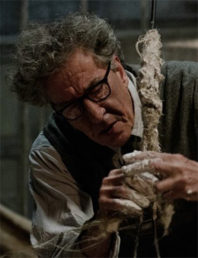
Have you ever wondered what it’s like to see the world through someone else’s eyes? Short of snagging some Black Mirror-type gadgetry or gaining telepathic abilities, experiencing art is as close as we get. Gifted artists pour their souls into creating physical expressions of the world as seen through their mind’s eye. Many artists find the creation process gruelling, happening in fits and starts for days, weeks, and even years. Lucky for us, the act of consuming art is simple. Final Portrait, by writer/director Stanley Tucci, offers a look at Swiss artist Alberto Giacometti’s laboured process. Coming in at a brisk 90-minutes, Final Portrait is as charming as it is lean, and it’s sure to strike a chord with anyone who has struggled to express themselves artistically.
Geoffrey Rush plays renowned artist, Alberto Giacometti. It’s 1964 and as the title implies, Giacometti is near the end of his career. Talented, adored by critics, and possessing more money then he cares to spend, Giacometti’s greatest desire is the one thing he can’t have: Artistic purity. But that doesn’t stop him from trying. Giacometti offers to paint a portrait of a young and handsome American art writer named James Lord (Armie Hammer). Flattered by the offer and game for the small time-commitment (an afternoon at the most), Lord accepts. Before Lord realizes it, he’s caught up in Giacometti’s uncompromising process. And what starts off as a few hours of posing balloons into three gruelling weeks.
Final Portrait’s production design does an exceptional job of putting you into Giacometti’s tortured headspace. The film utilizes a washed-out colour palette to start with, but Giacometti’s studio takes things to another level. It’s awash in dull whites, blacks, and smoky greys. Creepy, cramped, and littered with unfinished work, the place looks like how I envision Tim Burton’s garage. When the characters leave Giacometti’s studio, the world brightens up dramatically. Amber lights cast a warm glow over the crowds in cafes and restaurants. Flanked by carefree patrons who drink, smoke, and laugh, Giacometti’s ventures outside his studio serve as a stark visual contrast to the oppressive nature of his creative process.
Performance-wise, Final Portrait is a two-hander. We spend the bulk of our time with Giacometti, frustrated artist, and Lord, the humble observer. Hammer’s been on the verge of super-stardom for what seems like forever and it looked like he finally broke through last year with his turn in Call Me by Your Name. His 2017 momentum doesn’t carry over into this picture. If you go in expecting the same passion and charisma on display in Call Me by Your Name, I’m sorry to disappoint you. This isn’t a knock against Hammer’s work in Final Portrait either. There is nothing technically wrong with his performance, it’s that he has the thankless job of playing the audience’s stand-in; a soft-spoken, charming, and passive observer.
Tony Shalhoub and Annette Arm are tasked with even less to do as Giacometti’s brother Diego and wife Annette. Diego emits a glowing warmth towards his brother and understands his uncompromising methods. Diego knows when to step out of the way to let his brother’s process run its course and how to deal with his tirades. Annette however, can’t hide her frustration. When her husband isn’t in a fit of despair or giving himself over to his art, he gives himself over to a local prostitute/muse (Clémence Poésy).
Rush delivers yet another stellar performance in a career jam-packed with them. It only takes him a few moments of screen time to define the character (and he does so without speaking a word). Always stiff and hunched over, you can almost feel his bones creaking as he shuffles about. But every now and then, inspiration hits and it’s like a different person is sitting down behind his easel. It’s also a joy to watch Rush cycle through his character’s conflicting feelings; shrewd and bewildered; generous and selfish. Rush’s performance is so charming that even as Giacometti places unreasonable demands on those around him – his tantrums, his cheating, taking up Lord’s time – the character never feels like a total jerk.
Giacometti’s fussy creative process gets in the way of him producing art. He works in a series of stops and starts and is never happy with his creations. On a whim, he’ll slap paint over weeks of meticulous work, starting the process over again and again, never satisfied and never finished. As someone who writes under tight deadlines, I’ve learned that work is only “finished” once you hand it in. There are always more points to make, snappier descriptions to include, and stronger metaphors to insert. At a certain point, you must stop and share your work with the world. Giacometti’s success allows him to work at his own pace and his process verges on neurosis. If you needed a poster child for the phrase, “There’s a fine line between genius and insanity,” look no further.
When we look at a master artist’s work their off-the-charts level of craftsmanship appears almost effortless. When watching best picture winner, The Shape of Water, we don’t see the hundreds of hours Guillermo del Toro spent in the editing room or the many failed drafts of his script. We only see his well-polished final product. Everyone struggles with their creative process and Final Portrait is a welcome reminder that even geniuses battle the same doubts, insecurities, and frustrations as the rest of us.
Tucci has crafted a restrained picture that is slow, measured, and low-key to a fault – but it’s never dull. Credit Rush’s riveting lead performance which pumps each scene full of life and keeps the story flowing. If you have ever considered yourself an artist, then you’re guaranteed to recognize a part of yourself in Rush’s Giacometti. And if you’re not artistically inclined then Final Portrait will serve as an eye-opening look at what often goes into an artist’s creative process.
- Release Date: 4/06/2018


